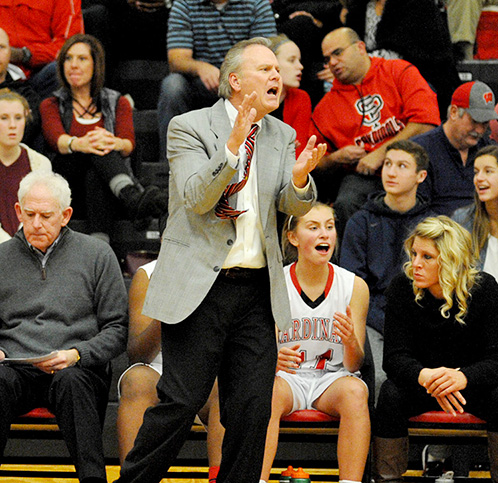Transformational over transactional coaching
What is the difference between the two?
Transformational coaches try to impact the lives of the individual student-athlete in all areas. Transformational coaches want to make an indelible impression that will last a lifetime.Transactional coaches think of the present moment, the immediate result. They think about how the student-athlete can benefit them more than how they can help the student-athlete beyond their playing days.
 There is an old saying “kids don’t care how much you know until they know how much you care.” I heard this when I first became a classroom teacher. In my years as a coach I have seen this apply as well, particularly in recent times. I believe the relationship between player and coach was always an important one, but now with changes in society the coaches have become more prominent figures in the lives of adolescents. We as coaches have a great opportunity to create a positive influence by embracing the role, transformational coach.
There is an old saying “kids don’t care how much you know until they know how much you care.” I heard this when I first became a classroom teacher. In my years as a coach I have seen this apply as well, particularly in recent times. I believe the relationship between player and coach was always an important one, but now with changes in society the coaches have become more prominent figures in the lives of adolescents. We as coaches have a great opportunity to create a positive influence by embracing the role, transformational coach.
In this article I will discuss ways in which one can become a transformational coach. These are based upon personal experience, observations of successful programs, as well as conversations I have had with peers in my profession. By no means are these the only methods that can be used.
Set A Standard
Within every successful program or organization are a set of standards that members of the organization believe in and abide by. A transformational coach will not only apply these standards but will explain their application to real-world circumstances. I have seen athletes ask questions about particular standards such as “ Why do I have to tuck my jersey in?” Early on in my career I was easily annoyed by such a question as I grew up with the notion that authority was to be respected and not challenged when a directive was given. However taking the time to answer a question such as this is a teachable moment. Perhaps the athlete has grown up in an environment that did not address appearance. As a coach we can explain that in life we are judged by our outward appearances. Taking the time to tuck our jersey in speaks volumes about how we choose to represent ourselves.
Being Real
Our athletes are smarter than we may give them credit for. They know when we are being real with them and when we have their best interests at heart. Being real is challenging in that we may have to tell our athletes things that they do not want to hear, particularly when it applies to things such as ability or playing time. However if we are real with them and deliver the message in a way that reflects caring and compassion, the athlete may not only be able to better accept the message but use it as positive motivation going forward. I have also found using personal examples from my playing career to be helpful. For example in addressing scout teams, I have explained that I was a scout team player on my college football team and that taking pride in my role helped my teammates to get better.
Creating A Culture of Caring Within The Team
As coaches we need to create a culture of caring within our programs. Here are some ways to show caring, compassion, and to build teamwork:
1). At the end of each practice, choosing a player to point out something that both the team did as a whole as well as something an individual teammate did.
2). Involving the team in community service projects to teach the importance of giving to others and the value of service to the community
3). Taking time either at the beginning or at the end of each practice to talk about an issue that does not pertain to basketball. In these discussions players are invited to share from personal experiences. I have seen teams really bond and come together through these moments.
4). Reading poems and short stories together and discussing how the main idea of the poem or story connects to the team and to the future.
5). Taking a break from basketball and engaging in a different sport such as touch football. (I have seen too that it is best to let the players take ownership by choosing teams and creating rules).
6). Team outings such as dinners, going to the movies, having a team movie night, or going to a sporting event as a team. Such events are relaxing as a team and provide opportunities to create memories that last a lifetime. I have had some great discussions with players during these outings about things beyond basketball which helped to strengthen the bond I had with them as player-coach.
7). Bringing in motivational speakers to talk about important life issues. This is important for a couple of reasons. This communicates the message that life is more important than basketball. Sometimes too, players may benefit from hearing a different voice talk about a topic that has previously been discussed.
8). Celebrating all successes within your team. These do not have to relate to basketball. Perhaps someone made the honor roll or a student struggling in a class did well on a test. This gives everyone the opportunity to feel a sense of accomplishment, particularly players who may not see a lot of playing time. It also communicates the idea that everyone on the team matters.
Alumni Connections/Keeping in Touch
As a coach it is important to reach out to alumni who have participated in the program. Perhaps these players played prior to a coach taking over. Creating these connections with alumni teaches your players that being a part of your program lasts for an eternity. For alumni who did not play for a given coach, it is an opportunity to feel important and be honored, particularly if they did not enjoy a positive experience during their playing years.
» Related: Pete Carroll, Steve Kerr exchange coaching advice on new podcast
The past alumni and current players who are graduating will also want to give back and help your program when they have positive feelings tied to it. Perhaps they can come back as motivational speakers or help current players in their programs find jobs.
I once heard Coach Roy Williams say that what he will remember most from his coaching career are the high fives and hugs from his players. We as coaches have an awesome opportunity to not only create champions for life but to develop friendships and relationships that will last a lifetime.
By Kevin Weigand, contributing writer; Please feel free to email Kevin at [email protected].







